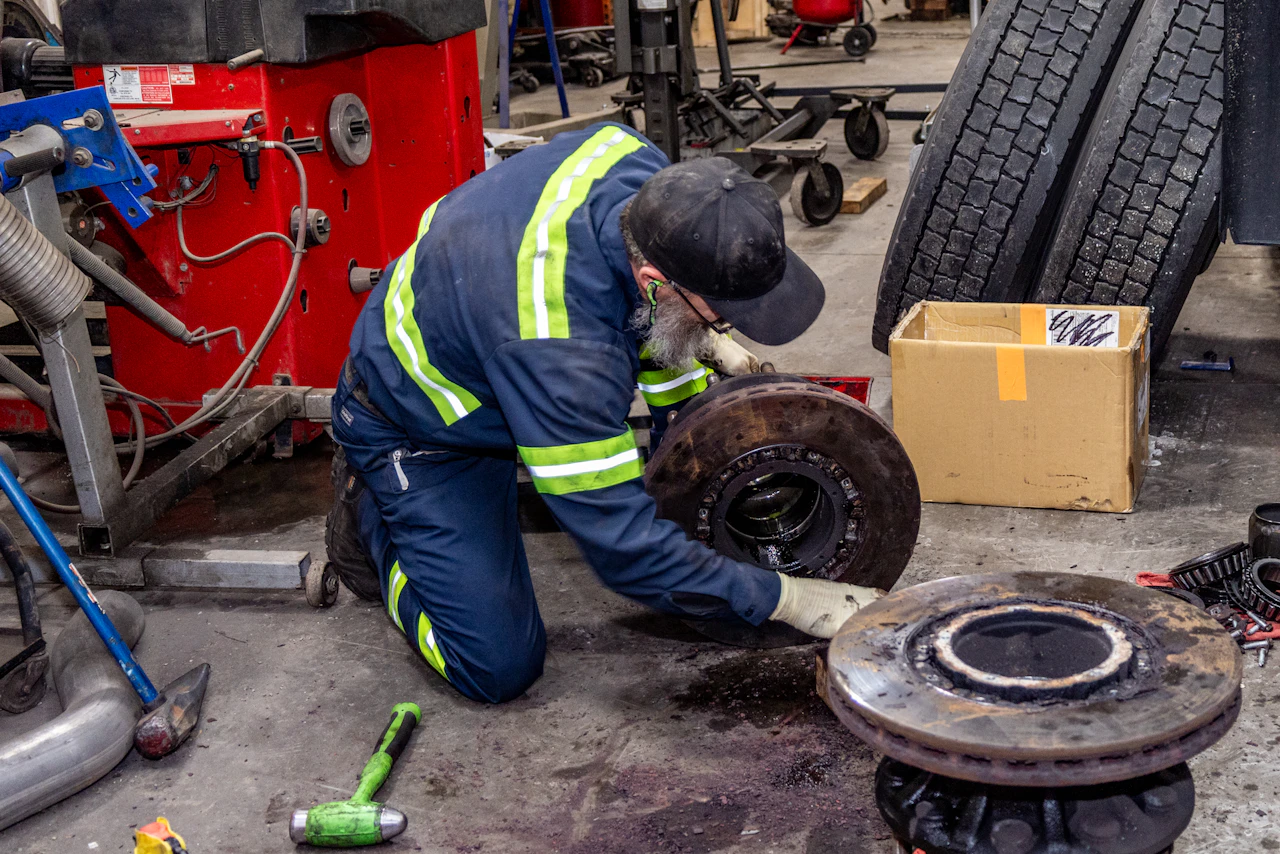We don’t need to tell you how important a truck’s cooling system is to your operations. However, understanding the causes and signs of failure, along with necessary maintenance and repairs, is absolutely crucial to keeping it in peak condition. By the end of this article, you will be armed with all the information you need to keep your engine cool and your operations moving forward.
Understanding the Diesel Engine Cooling System
Cooling systems are made up of a range of components designed to manage and dissipate the huge amounts of heat that truck engines create during combustion.
- The radiator acts as the primary heat exchanger.
- The water pump propels coolant throughout the engine.
- The thermostat regulates the flow of coolant based on the temperature.
- Cooling fans enhance the airflow through the radiator.
- And, of course, the coolant itself, which carries the heat away from the engine.
Each component is critical for maintaining the delicate balance of the engine's operating temperature, ensuring it performs efficiently under all conditions.
Common Cooling System Problems
Overheating
Overheating is one of the most significant threats to diesel engines. The quickest way to identify this as an issue in your vehicle is to notice an increase in the engine’s temperature gauge or illuminated warning lights.
A broken thermostat, blocked radiators, and low coolant levels are just a few of the possible causes of this. Regular monitoring of coolant levels and ensuring the radiator is free of debris are quick and effective measures you can take to prevent overheating.
Leaks
Leakage in the cooling system can occur at any point, most commonly within hoses, the radiator, or the water pump. These leaks generally cause a visible puddle of coolant underneath the truck and a noticeable drop in coolant levels. Routine inspections of your coolant level are the best way to check for leaks, which can prevent more severe issues.
Corrosion and Scale Buildup
Over time, corrosion and scale can form within the cooling system, significantly reducing its efficiency. This is often due to the use of incompatible coolant types or neglecting to replace the coolant within recommended intervals. Regular system flushes and using the correct coolant can prevent these issues.
Faulty Cooling Fans
A malfunction in the cooling fans can lead to overheating, especially when the vehicle is stationary. Ensuring these fans are operational and in good condition is key to a well-functioning cooling system.
Thermostat Failures
Thermostats can fail in two ways: by sticking open, causing the engine to run too cold, or by sticking closed, causing overheating. Both scenarios can impact engine performance and fuel efficiency. Regular checks can prevent thermostat-related issues.
Common Causes of Cooling System Failure
Understanding the root causes of cooling system failure is essential for effective maintenance and troubleshooting. These can include:
Age and Wear: Over time, components of the cooling system can degrade, leading to reduced performance and failures.
Poor Maintenance: Neglecting regular maintenance checks and coolant replacements can lead to a buildup of contaminants and eventual system failure.
Use of Incorrect Coolant: Different engines require specific types of coolant. Using the wrong type can damage the system and reduce its effectiveness.
External Damage: Impact from road debris can damage the radiator and other cooling system components, leading to leaks and inefficiency.
Thermal Stress: Repeated cycles of heating and cooling can lead to material fatigue, especially in hoses and seals, eventually causing them to fail.
Preventive Maintenance Tips
Regular Inspection and Cleaning
Routine checks and cleaning of the cooling system are indispensable for the early detection of potential issues. This includes inspecting for leaks, ensuring the radiator is clear of obstructions, and checking component integrity.
Coolant Checks and Replacement
Coolant level and quality should be monitored regularly, with replacements done according to the engine manufacturer's guidelines. Utilizing the appropriate coolant is crucial for system health.
System Flushes
Cooling system flushes, performed at manufacturer-recommended intervals, can remove harmful corrosion, contaminants, and scale to ensure the system functions efficiently.
Hose Inspections
Hoses are prone to wear and should be checked regularly for signs of fatigue, cracks, or leaks. Replacing worn hoses can prevent unexpected failures.
Diagnosing and Addressing Cooling System Repairs
Step-by-Step Diagnostic Approach
A systematic approach to diagnosing cooling system issues involves inspecting all components for visible damage, leaks, or wear. Checking coolant levels, assessing thermostat functionality, and ensuring fan operations are integral to this process.
Professional Inspection
Complex issues or uncertainties should be left to the professionals to carry out a diagnostic evaluation. Specialist coolant system mechanics can accurately identify issues and recommend effective solutions.
Repair and Replacement
Whether a component should be repaired or replaced depends on its condition and the nature of its failure. Generally, components like hoses and thermostats are more economically replaced, while others may be suitable for repair.
Choosing the Right Parts and Fluids
Choosing high-quality, compatible parts and fluids is essential for repairs and maintenance. This ensures repairs last, and the system operates at peak efficiency.
Final Words
A deep understanding of diesel engine cooling system repairs, coupled with regular maintenance, is key to minimizing unscheduled downtime and avoiding expensive repairs. To maintain your vehicles' cooling systems, prioritize regular inspections, coolant management, and professional assessments.

